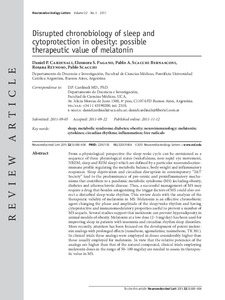Por favor, use este identificador para citar o enlazar este ítem:
https://repositorio.uca.edu.ar/handle/123456789/1615| Título: | Disrupted chronobiology of sleep and cytoprotection in obesity : possible therapeutic value of melatonin | Autor: | Cardinali, Daniel Pedro Pagano, Eleonora Samanta Scacchi Bernasconi, Pablo A. Reynoso, Roxana Scacchi, Pablo |
Palabras clave: | SUEÑO; DIABETES; OBESIDAD; RITMO CIRCADIANO; RADICALES LIBRES; MELATONINA | Fecha de publicación: | 2011 | Editorial: | Maghira and Maas Publications | Cita: | Cardinali, D. P., et al. Disrupted chronobiology of sleep and cytoprotection in obesity : possible therapeutic value of melatonin [en línea]. Preprint del documento publicado en Neuroendocrinology Letters. 2011, 32 (5). Disponible en: https://repositorio.uca.edu.ar/handle/123456789/1615 | Resumen: | Abstract: From a physiological perspective the sleep-wake cycle can be envisioned as a sequence of three physiological states (wakefulness, non-rapid eye movement, NREM, sleep and REM sleep) which are defined by a particular neuroendocrine-immune profile regulating the metabolic balance, body weight and inflammatory responses. Sleep deprivation and circadian disruption in contemporary “24/7 Society” lead to the predominance of pro-orexic and proinflammatory mechanisms that contribute to a pandemic metabolic syndrome (MS) including obesity, diabetes and atherosclerotic disease. Thus, a successful management of MS may require a drug that besides antagonizing the trigger factors of MS could also correct a disturbed sleep-wake rhythm. This review deals with the analysis of the therapeutic validity of melatonin in MS. Melatonin is an effective chronobiotic agent changing the phase and amplitude of the sleep/wake rhythm and having cytoprotective and immunomodulatory properties useful to prevent a number of MS sequels. Several studies support that melatonin can prevent hyperadiposity in animal models of obesity. Melatonin at a low dose (2‐5 mg/day) has been used for improving sleep in patients with insomnia and circadian rhythm sleep disorders. More recently, attention has been focused on the development of potent melatonin analogs with prolonged effects (ramelteon, agomelatine, tasimelteon, TK 301). In clinical trials these analogs were employed in doses considerably higher than those usually employed for melatonin. In view that the relative potencies of the analogs are higher than that of the natural compound, clinical trials employing melatonin doses in the range of 50-100 mg/day are needed to assess its therapeutic value in MS. | URI: | https://repositorio.uca.edu.ar/handle/123456789/1615 | ISSN: | 1337-933X (impreso) 1338-4015 (online) |
Disciplina: | MEDICINA | Derechos: | Acceso Abierto | Fuente: | Neuroendocrinology Letters. 2011, 32 (5) |
| Aparece en las colecciones: | Artículos |
Ficheros en este ítem:
| Fichero | Descripción | Tamaño | Formato | |
|---|---|---|---|---|
| disrupted-chronobiology-sleep-cytoprotection-obesity.pdf | 341,93 kB | Adobe PDF |  Visualizar/Abrir |
Visualizaciones de página(s)
274
comprobado en 30-abr-2024
Descarga(s)
126
comprobado en 30-abr-2024
Google ScholarTM
Ver en Google Scholar
Este ítem está sujeto a una Licencia Creative Commons

